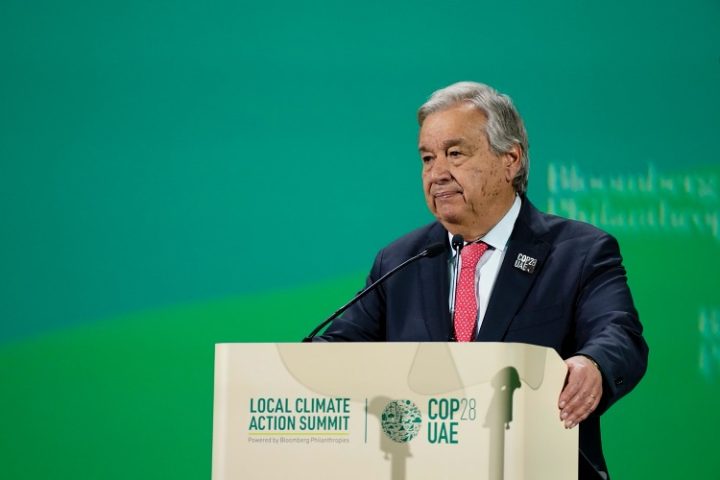
“Global stocktake” appears to be this year’s buzz phrase at the UN climate summit in Dubai. In his opening remarks yesterday, Simon Stiell, executive secretary of the UN Framework Convention on Climate Change, warned that the world is “standing at a precipice, facing the Global Stocktake.” On December 1, at the official opening ceremony, UN Secretary General António Guterres invoked the phrase repeatedly, warning that the “success of this COP depends on the Global Stocktake prescribing a credible cure in three areas.” For those uninitiated into the latest faddish usages, “stocktake,” as either a noun or a verb, refers to assessing and recording the amount of stock held by a business, and appears to be derived from the common phrase “taking stock.” What UN movers and shakers mean by this term was clarified by Guterres as he laid out the “three areas” of urgent action:
First, drastically cutting emissions. Current policies would lead to an earth-scorching three-degree temperature rise. The Global Stocktake must set clear expectations for economy-wide Nationally Determined Contributions, that cover all greenhouse gases, and align with the 1.5-degree limit. The G20 — which represents 80 per cent of the world’s emissions — must lead. I urge countries to speed up their net zero timelines, to get there as close as possible to 2040 in developed countries and 2050 in emerging economies.
Second, we cannot save a burning planet with a firehose of fossil fuels. We must accelerate a just, equitable transition to renewables. The science is clear: The 1.5-degree limit is only possible if we ultimately stop burning all fossil fuels. Not reduce. Not abate. Phaseout — with a clear timeframe aligned with 1.5 degrees.
The Global Stocktake must not only commit to that — it must also commit to triple renewables; double energy efficiency; and bring clean energy to all by 2030.
The economics are clear: the global shift to renewables is inevitable.
The economics are certainly clear, as the catastrophic Biden-administration energy policies and their consequences have shown in ever-greater clarity. Waging war against fossil fuels, as Biden has done, and seeking to replace them with allegedly cleaner “renewables,” is a recipe for economic collapse and the end of the modern age with all of its cornucopia of benefits. These benefits include not only gasoline and natural gas, but also plastics, all of them derived from “fossil fuels.” It’s a recipe for returning to the world of the 18th century, before coal or oil was burned as fuel, and before plastics revolutionized material science. Such an agenda, if successfully realized, would entail a massive dieback owing to drastic curtailment of agricultural productivity — or do the would-be eco-tyrants believe that modern farm machinery, shipping materials, and fuel to energize the system of food production and distribution can be miraculously achieved without reliance on fossil fuels?
Moreover, the politics are equally clear, as attested by the confident and coercive cadences of Guterres’ address. Word choices such as “must” and “inevitable” signal the growing confidence of the climate globalists that their agenda will be implemented, and that political roadblocks of yesteryear, such as concerns over national sovereignty and the stymieing of modern progress, are dissipating, at least among elite policymakers. A large part of that confidence is no doubt due to the Biden administration’s slavish implementation of broadly unpopular energy policies in the name of Paris Agreement requirements — with zero regard to the protests of ordinary Americans, who have watched soaring fuel prices and other self-imposed shackles on
American industry erode their standard of living.
But in the end, if these ultra-radical global reforms take full effect, even the elites will feel the pain, as the Left finally achieves its ultimate goal: the destruction of modern Western civilization by any means possible. But if they succeed in so doing, they will kill the very goose whose golden eggs they have long harvested to their own benefit.



